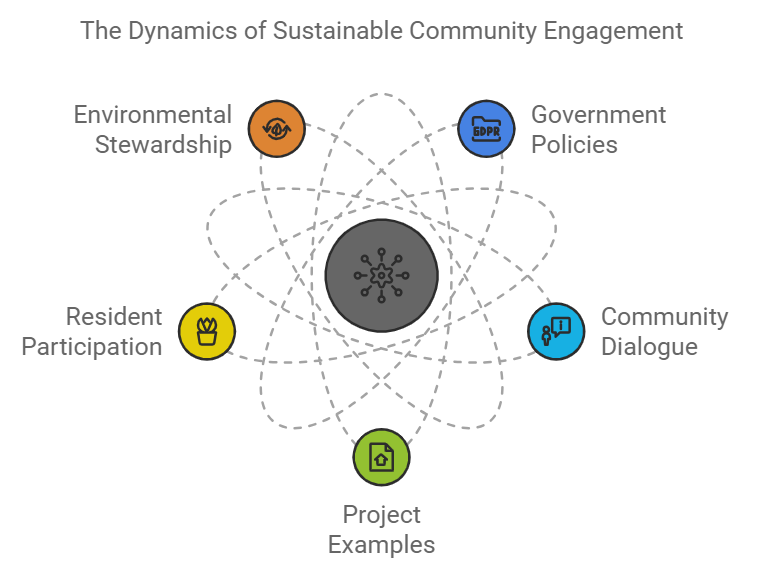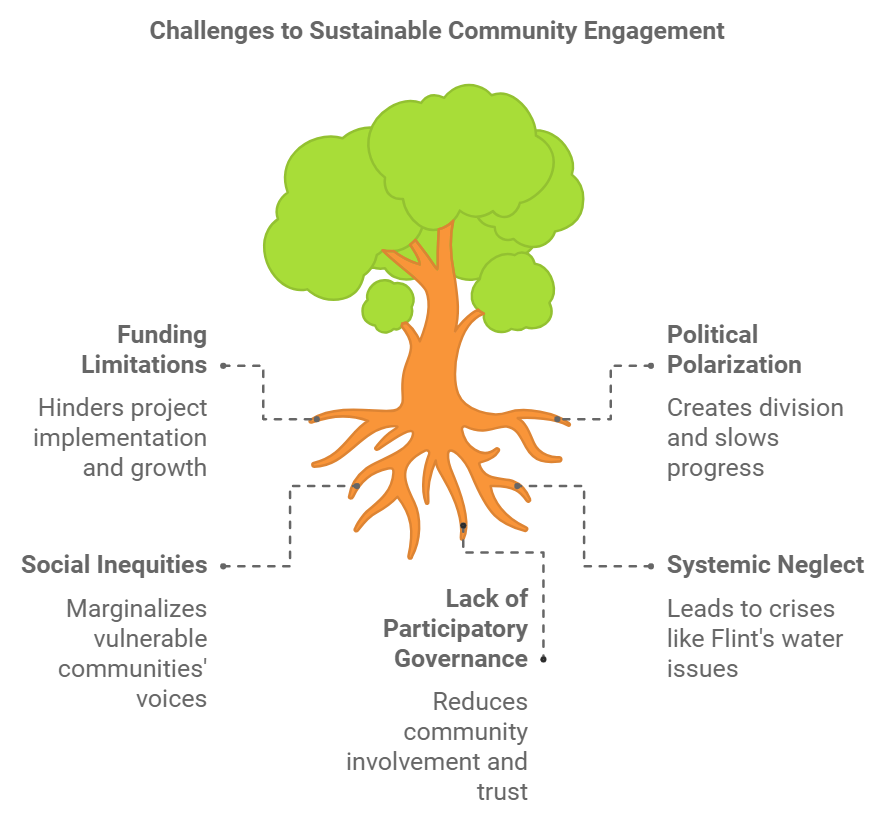In the United States, projects that involve partnerships with community partners and stakeholders often prioritize ethical governance and community engagement. These initiatives aim to promote societal well-being and address disparities in local communities through participatory research, advocacy, and civic involvement. Institutional partnerships between higher-education institutions, nonprofits, local government, and other stakeholders play a crucial role in fostering ethical conduct and social change in research projects. These collaborations involve developing ethical guidelines, promoting accountability, and ensuring that research ethics committees uphold ethical principles and standards. Community engagement is at the core of these initiatives, as they strive to involve community members in every stage of the research process. This participatory approach ensures that research projects are conducted ethically and responsibly, with research participants’ informed consent, confidentiality, and dignity being of utmost importance. Projects in the U. S. also focus on capacity-building and empowerment in local communities, promoting volunteerism, mentorship, and philanthropy to address societal needs. This approach to community development fosters civic engagement and social responsibility, leading to sustainable development and positive social impact. Ethical considerations are paramount in U. S. projects, with a strong emphasis on maintaining confidentiality, respecting autonomy, and upholding beneficence and justice. Ethical dilemmas and concerns are addressed through ethical decision-making processes and codes of conduct that guide researchers and practitioners in their engagement activities. Community involvement in research projects is seen as essential for promoting social justice, fostering partnerships, and disseminating findings to the wider community. Ethical behavior and accountability are central to ensuring that projects adhere to ethical guidelines and prevent unethical conduct or violations. Overall, U. S. projects that reflect ethical governance and community engagement are guided by a commitment to upholding ethical standards, promoting civic participation, and collaborating with community partners to address societal needs and promote well-being. Through these initiatives, the U. S. demonstrates leadership in engaged scholarship, ethical research practices, and community development.
In these times, when we’re facing climate change, social inequality and economic uncertainty, it’s more important than ever to embrace sustainability as a cornerstone of responsible governance. But what does it really mean for a government to embrace sustainability? There’s so much more to sustainability than just the statistics and policy papers. It’s a vibrant tapestry, woven from the threads of ethical responsibility and community engagement. As we dive into this important topic, let’s take a closer look at how U.S. sustainability projects are not only great examples of environmental stewardship, but they also reflect some really important values that connect with communities all across our great nation.
The Ethical Imperative
Imagine standing in a sun-drenched park surrounded by families enjoying picnics while children play on freshly installed green spaces. This is not just a vision; it’s the result of local government initiatives focused on sustainable urban development. In cities like Portland, Oregon, and Minneapolis, Minnesota, officials are prioritizing eco-friendly practices, be it through green roofs or renewable energy sources, to foster healthier environments for their constituents.
These projects exemplify ethical governance, a commitment to prioritizing public well-being over short-term gains. By investing in sustainable infrastructure, governments signal that they value long-term ecological health alongside economic growth. Such initiatives create ripples that extend beyond immediate benefits; they cultivate trust within communities that feel seen and heard.

A Story from the Heartland
Take the case of Lawrence, Kansas, a city often overlooked in national conversations about sustainability yet bursting with innovative ideas. In 2019, local leaders launched “Lawrence Creates,” an initiative aimed at transforming vacant lots into community gardens. These gardens not only beautified neighborhoods but also served as vital food sources for residents struggling with food insecurity.
As stories poured in from families who had transformed their lives through gardening, the single mother who learned to grow vegetables with her children or the elderly couple who found companionship among fellow gardeners, it became clear: these projects did more than provide sustenance; they nourished souls. They embodied ethical engagement where local governance directly addressed community needs while fostering relationships among diverse populations.
Engaging Communities: A Collaborative Approach
Sustainability is not merely about implementing policies; it’s about creating dialogue between governments and citizens. Projects like Chicago’s “Green Urban Design” showcase how inclusive decision-making can lead to impactful results. Through workshops and forums, residents actively participated in shaping their environment, discussing everything from tree planting to water conservation strategies.
When communities have a seat at the table, ownership emerges, people become invested stakeholders rather than passive recipients of governmental decisions. This sense of agency fosters pride in shared spaces and cultivates an ethos of collective responsibility toward maintaining them.

A Glimpse Into Innovation
Consider the groundbreaking work being done in San Diego with its “Climate Action Plan.” The city set ambitious goals to achieve 100% renewable energy by 2035 while engaging citizens through educational programs designed to raise awareness about climate issues. Residents participate in clean-up drives along coastlines or attend workshops on energy efficiency, all efforts reflecting an understanding that individual actions contribute to broader societal goals.
These initiatives resonate deeply because they speak directly to people’s experiences and aspirations, reminding us that sustainability isn’t merely an abstract concept reserved for policymakers but something we can all partake in every day.
Bridging Challenges Through Resilience
However noble these intentions may be, challenges persist, funding limitations, political polarization, and social inequities threaten progress toward sustainability goals across various regions. Nevertheless, resilience shines brightest when communities rally together amid adversity.
Take Flint, Michigan, a city grappling with water crises exacerbated by systemic neglect, where grassroots movements have taken charge by advocating for safe drinking water access through creative solutions like rainwater harvesting systems or neighborhood filtration programs powered by local nonprofits.
These acts demonstrate how community-led efforts can pave pathways toward recovery even when faced with formidable obstacles and they underscore the importance of participatory governance rooted in ethics and empathy.

Conclusion: A Call To Action
As we navigate our way forward amid pressing global challenges, from climate change to social justice, the lessons gleaned from U.S. sustainability projects stand out starkly against despairing narratives dominating headlines today:
Sustainability reflects our collective values, revealing how much we care about future generations’ quality of life; it showcases our commitment towards inclusivity by ensuring marginalized voices are heard; it embodies resilience when communities come together despite hurdles thrown their way.
Let us celebrate these projects, not just as isolated successes but as reflections of what’s possible when ethics meet action grounded firmly within engaged communities! Together we can weave new narratives filled with hope, and inspire others around us too!
So let’s roll up our sleeves! Whether you’re attending your next town hall meeting or starting your own community garden project, every effort counts towards nurturing both people and planet alike!
I really enjoyed reading this article—it’s both engaging and full of valuable insights.
The website is a fantastic source of information.
Thank you so much for your thoughtful comment! I’m delighted to hear that you found the article engaging and insightful. Your feedback truly motivates me to keep sharing helpful content. I appreciate your support and hope you continue to find value in the website!
Hello.This article was really motivating, particularly since I was looking for thoughts on this topic last couple of days.
I like the efforts you have put in this, appreciate it for all the great blog posts.